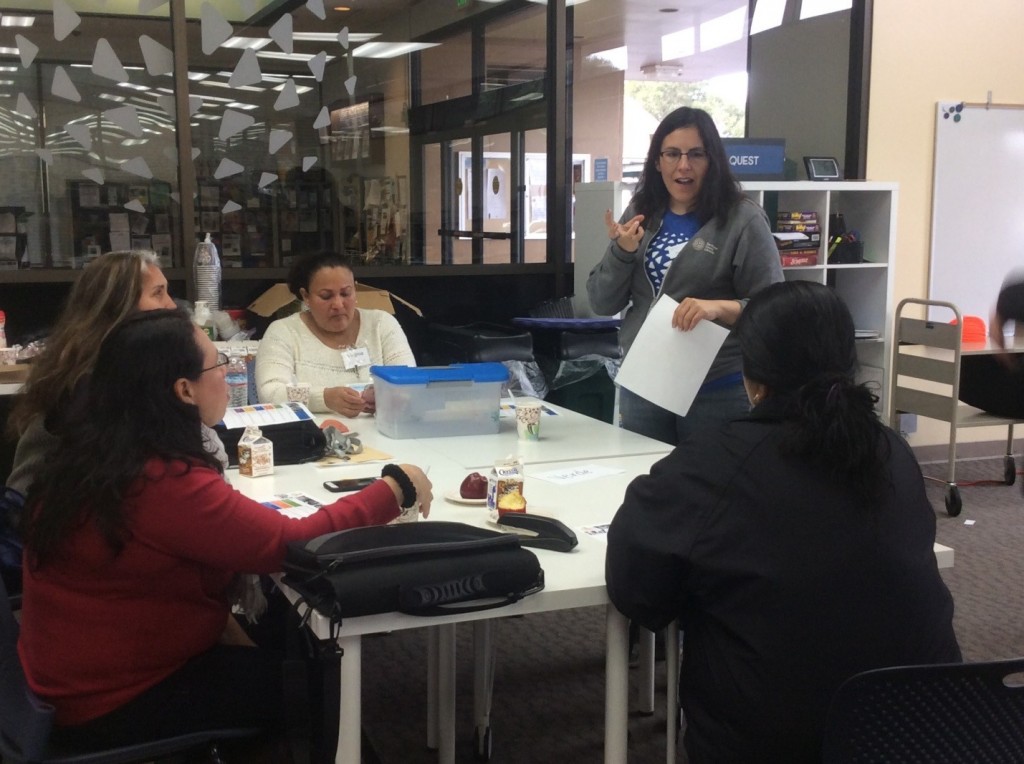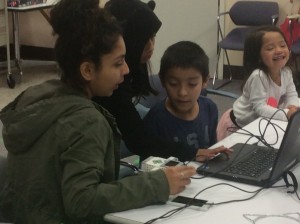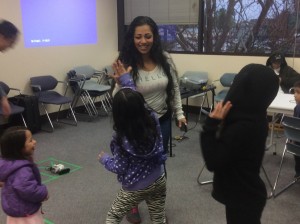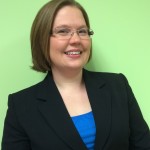Program Spotlight: Goals set the stage for Toyota Family Learning
In this post by Patricia Lovett, team leader for family learning at the National Center for Families Learning, learn how goalsetting is an important step in helping families make educational and economic gains:
On a recent visit to support Toyota Family Learning at San Mateo County Library, I was energized to see our conversations about goalsetting in action with families in their program. I am the technical assistance coach for the library, so I get to visit this program annually and work with them to provide the best service possible for families. We spend a lot of our professional development time on goals, and it was great to see library staff digging deeper into individual goals in Parent Time as well as family goals in Parent and Child Together (PACT) Time®.
How are library staff members facilitating goalsetting?
In Parent Time, staff members divided parents into small groups of 3-5 based on top-priority goal areas they had identified in a previous session and in the initial interview for the program. Groups include topics like learning English and saving money for specific purposes.
Parents used a worksheet created by NCFL and facilitator guidance of the SMART goals process to put their goals into actionable steps. With well-defined goals in hand, parents worked within their new accountability groups to think through the action steps they will take to reach their goals.

The journey toward achieving these goals doesn’t end with talk, though.
The hidden jewel of this approach is that parents are also building social capital within their community. Parents know they all need to be there for each other, so they are checking in and updating each other on their progress. They build new connections with others in the group and expand their networks to achieve more than just their individual goals for the program.
Staff members begin this goalsetting process with interview data they are already collecting from families as part of the program evaluation. By analyzing that information further, they engage in data-driven programming that meets the needs the families identify. Sessions are designed to target individual and family goals.
With Facebook and Google headquartered nearby, it is no wonder that many families have goals focused on increasing their technological know-how. On this visit, I also had the exciting opportunity to check out a new PACT Time offering—Lego robotics! On Friday evening, in the East Palo Alto Library, a small group of families gathered to try their hand at building code sequences to direct the robot they all collaborated to build the previous week.

Staff member Kenny outlined a simple obstacle course on the floor with tape and gave a quick tutorial on how to adjust the robot’s code. Then families were off to make some safe mistakes and engage in fun critical thinking together. In time, these amateur robot coders began to achieve the goal. As they got the code correct, the course was expanded. I’m so glad I got the chance to see this unique two-generation digital literacy builder in action as well as the persistence and social-emotional bonds that families developed along the way.

Using data and participant goals to guide programming isn’t new or innovative, but it is a solid foundation for your program to show families your investment in their future. Please share how you work with family goals with us—and if you’re not focusing on goalsetting to drive your programming, start today! Choose one step you can take to incorporate family goals, make it a habit, and then add another.
About the Author
 Patricia Lovett, Team Leader for Family Learning, National Center for Families Learning (NCFL)
Patricia Lovett, Team Leader for Family Learning, National Center for Families Learning (NCFL)
Patricia Lovett’s educational career spans college preparatory, high school and elementary classroom experience as an ESL instructor and Spanish teacher. Dedicated to parents and children learning together, her subject matter specialty is in practice across initiatives at NCFL including digital platforms and community-based programming such as Toyota Family Learning. She utilizes her experience with diverse families to inform the practice of meeting families where they are, building on the strengths they already possess to cultivate capable, confident contributors to communities across the nation. She holds a BA in Spanish and a Masters of Art in Teaching English to Speakers of Other Languages from Murray State University and currently serves as secretary of the Kentucky TESOL affiliate organization.
About Toyota Family Learning
Toyota Family Learning is a multi-generational solution to educational challenges that responds to societal changes and opportunities. This modern-day movement, now in 16 communities nationwide, is a harbinger for Family Service Learning—families learning and achieving together and mentoring each other—and is a visible partner in environmental stewardship, financial literacy, volunteerism, and civic engagement.
This 6-year nationwide initiative, led by NCFL and funded by Toyota, was created to address educational needs and provide opportunities for low-income and ethnically diverse families to roll up their sleeves and build stronger communities. NCFL knows that when children and families solve community issues together, they are simultaneously learning and applying 21st-century college and career readiness skills.